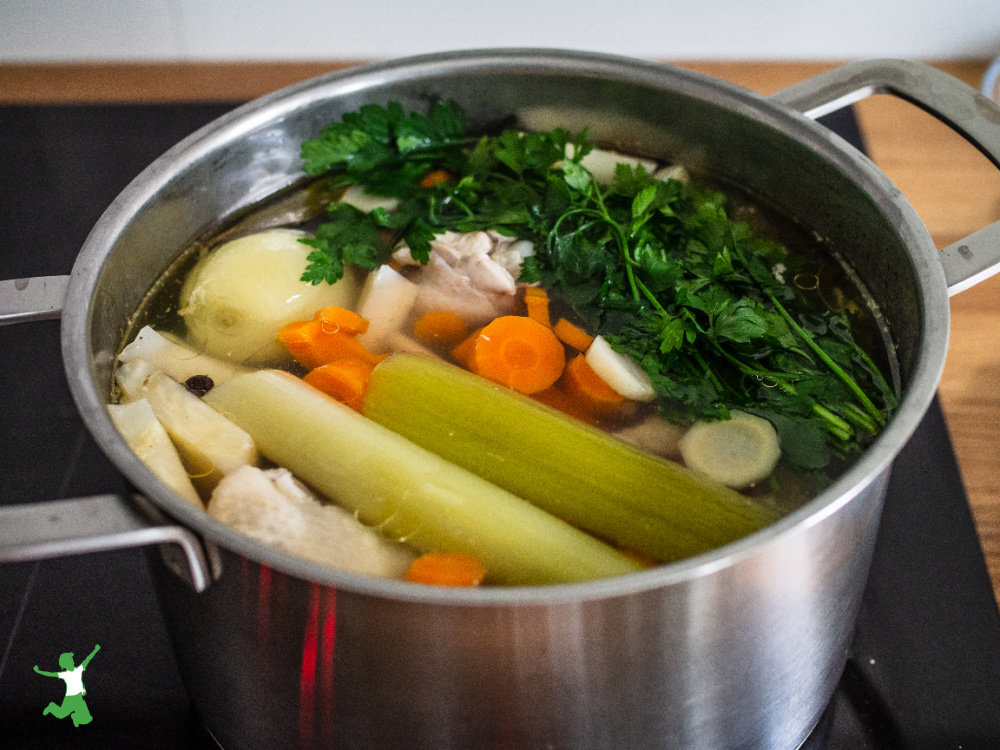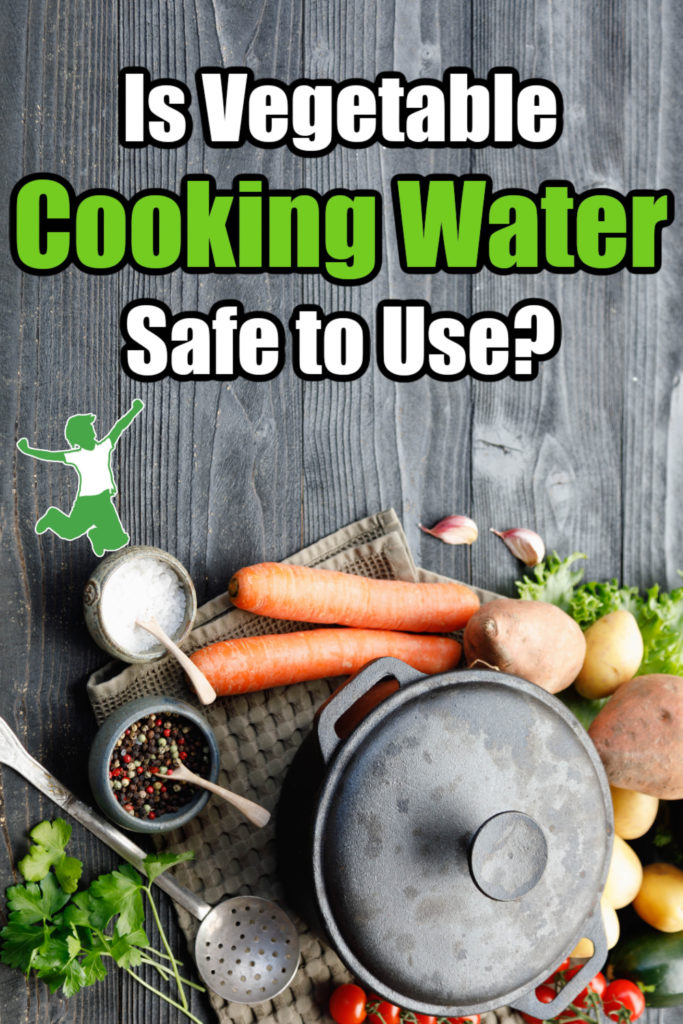Guidelines for when vegetable cooking water is safe to use and when it is best to toss due to nitrites, residues or anti-nutrients that can do more harm than good.

Adelle Davis popularized the practice of saving vegetable cooking water during the Leave it To Beaver era of the American 1950s.
She reasoned that any vitamins and minerals lost from cooking the vegetables would end up in the water.
This supposedly nutrient-rich cooking water could then be added to homemade soups or sauces with the nutrition benefiting those that consumed them.
This notion took hold and has not let go to this day.
Unfortunately, reserving vegetable cooking water can do more harm than good.
Consider the reasons below before you use it in your dishes. How to know your veggie cooking water is safe is discussed as well.
Chemical Residues
If the vegetables that are cooked are not organic, pesticides and nitrites from commercially produced fertilizers can end up in the cooking water.
Even low to no spray veggies such as asparagus would not be safe.
These crops are still typically fertilized with commercial preparations that are high in nitrites.
Anti-Nutrients
Cooking cruciferous vegetables such as broccoli, cauliflower, cabbage, Brussels sprouts, and kale would add goitrogenic (thyroid blocking) substances to the cooking water which should be discarded.
Water used to boil potatoes would contain chemicals called hemagglutinins that disrupt red blood cell formation.
Dark green, leafy vegetables such as beet greens, raw spinach, and chard contain oxalic acid that blocks calcium and iron absorption.
This irritating substance also can cause distress to the sensitive mucous membranes in the mouth and intestinal tract and contributes to the formation of kidney stones.
Consuming raw crucifers or dark, leafy greens is not an alternative either as the substances that cause problems when in the cooking water also cause problems if consumed directly with the vegetable in an uncooked state such as a raw green smoothie.
Legumes & Beans
For the last few years, the vegan community has popularized the trend of reusing legume cooking water, particularly from chickpeas.
This isn’t a safe practice even if the legumes or beans are soaked before cooking.
This soapy, slimy water is called aquafaba and is used as an egg replacement, particularly in dessert recipes. It whips up foamy just like egg whites.
Published research reveals that chickpea cooking water contains saponins, a potent anti-nutrient that contributes to leaky gut, which is at epidemic levels today.
It is also not advisable for pregnant women to consume this substance as it is a miscarriage risk.
Safe Vegetable Cooking Water
Do you really want to use vegetable cooking water as a frugal tool in your kitchen routine?
Consider this list of some of the most popular vegetables below. They are safe to use for that purpose.
- carrots
- turnips
- potatoes (peelings)
- parsnips
- beets
- celery
- organic pumpkins and squash (including zucchini)
- organic onions, leeks, and garlic
- nightshades (tomatoes, eggplant, and peppers among a few others)
For example, this potassium broth recipe uses vegetables simmered in water from the list above.
Simple Guidelines To Follow
Do you find it confusing to remember the distinctions between which organic veggies are safe to use and which are not?
Or, do you buy some veggies organic and others conventional?
If so, it is best to just adopt the practice of not using the cooking water at all.
This is particularly true if you tend to mix veggies together when cooking them.
Never Use Veggie Water for Baby Food
It is of particular importance NOT to use vegetable cooking water for use in pureeing homemade baby food.
Use pure filtered water instead, or if baby is old enough, some homemade bone broth or meat stock.
Final Caution to Consider
One final word of caution.
All vegetables tend to form nitrates after cooking and during storage. These nitrates can transform into strong carcinogens in the intestines.
Hence, it is best to avoid refrigerating and reheating vegetables, particularly leafy, green vegetables which concentrate nitrates when grown commercially.
References
Nourishing Traditions Cookbook









This is absolutely ridiculous. I should stop eating vegetables altogether i guess. I think you people with your excessive scientific knowledge are making lives more difficult than easy for us. There are more exceptions than there are rules. Don’t mix vegetables with fruits. don’t mix acidic vegetables with alkiline ones. Then one comes across you who says cook your vegetables because raw vegetables harm you and then to top it all you tell us don’t refrigerate and reheat your vegetables. Are you god damn serious? You guys turn normal people away from good health rather than promote it.
I absolutely agree! I’ve turned to a much healthier diet over the past few years giving up all the processed junk of my early 20s. My concern of course was trying to prevent and cure health problems. I thought I had it down pat until I read stuff like this that says vegetables will give me cancer, hypothyroidism, and oxalate crystals tearing up my whole body. Well, why the hell did I quit eating processed food than? If it’s all going to kill me I might as well die eating a donut. Articles like this really give people like me anxiety. Because it seems you just can’t win when it comes to food. Unless I seriously want to have a 3 inch binder full of very specific scientific research to leaf through just to make a meal properly without “risk.” It’s just getting down right ridiculous to be healthy these days. When health foods like vegetables start coming under scrutiny for causing health problems I think we have bigger problems to worry about…people with too much time on their hands that turn simple ways to health into damn rocket science that says, “only those who study food like they’re trying to pass the damn BAR will live long and prosper.”
I don’t understand this article its seems SO CONFUSING my head is about to EXPLODE I have always been a vegetable consumer you name it i’ll eat it prepared anyway RAW too ..especially potatoes I have been eating them since I was a small child I dunno why I love em but if I get around a raw potato I’m gonna eat it..I grew up on SOUPS, and STEWS, and all kinds of veggie dishes.. never been over weight, my blood pressure runs around 102/70, I look like I’m in my early 20s and I’m near 40 ..I have always thought veggies are like FOOD OF THE GODS..they do a body good ..pass it on =) Remember the old saying “take everything you hear with a grain of salt” but its up to the individual in the end..
I’m confused with this information about it be harmful to use cooking water. How is this different than making homemade vegable stock? Your site gives instructions on another page about making broth from boiling vegetables. Seems contradictory to this page? https://www.thehealthyhomeeconomist.com/stock-vs-broth-are-you-confused/
Please advice or explain the difference.
Thanks!
I totally understand the logic of some vegetables being high in oxalates and such, but I often wonder- did the ancient tribes and traditional cultures cook their salad greens like spinach and kale? I would think that the healthy traditional cultures ate the majority of their foods raw, especially the plant based foods, as they did not have all the modern cooking conveniences we have today like stoves etc…I do love your blog by the way- it always keeps my brain and health information challenged 🙂
So you’re saying that broccoli is bad for you. Cauliflower is bad for you. Cabbage is bad for you. Brussels Sprouts are bad for you. (Turnips are a cruciferous vegetable so those are bad for you too.) Kale is double bad for you because it’s green and it’s cruciferous. Beet greens are bad for you. Spinach is bad for you. Chard is bad for you. (Beets are also bad for you because they contain oxalates as well.) Raw vegetables are bad for you. (Zucchini, carrots, and nightshades are also bad for you because they contain some oxalates too.) Boiled vegetable water is bad for you. (Vegetables that are steamed have got to be bad for you too because that stuff that leaches out is still stuck in the vegetable.) Potatoes are bad because that bad stuff that leaches out in the water is still inside the vegetable. Vegetables that aren’t organic are bad for you. All vegetables are bad for you. All I can say is WHERE WERE YOU WHEN I WAS 8 YEARS OLD AND MY MOM MADE ME EAT MY VEGETABLES? I’m not sure if this is meant to be a serious piece, but this is absolutely hilarious. Do you mind if I copy and it and use it as a basis for a funny article?
Marina Martin I would not worry about your refrigerated soups. The veggies are in the liquid and not exposed to air and although I am no chemist, I suspect this would keep nitrates from forming like if the cooked veggies were simply in a container in the fridge.
Kristen Davenport Katz fermented cabbage juice rocks! Totally with you on that one!
Marina, that’s because there is no real research about anti-nutrients in cabbage. It’s total bunk. You can safely drink cabbage water and it’s good for you. Cabbage juice has been shown in several studies to cure and/or relieve ulcers. Cabbage is well-known protector against cancer. Unless you have a thyroid disorder, there is absolutely no need to avoid drinking the juice of cabbage, and anyone who tells you otherwise is spouting nonsense.
My toddler loves soups and this is a concern. She would not eat any vegetables outside the soup. How is with nitrites in cooked vegetables if there are in a soup and it stored in a refrigerator for a few days?
Sarah, I know something does not agree with this modern time research. I would like your opinion on this. Just an opinion since I know no one knows everything. In Russia and Ukraine traditionally Shi and Borsh (traditional soups) was always consumed on almost everyday bases and the majority of it in Borsh is cabbage especially in Shi. They are made with beef broth and eaten with little bit of sauerkraut and cream. Cabbage always cooked right in the broth. Back then when we did not have stores and industries, Russia had the strongest people in the world. I know for sure those soups were consumed in great quantities by huge strong looking like bulls men. It was a staple food along with beets. Soups were consumed in a day or two since there were no refrigerators. But in the winter, outside was used as refrigerator and soups were cooked in large quantities. In Russia there is a saying that soup the best the next day. This does not agree with all this new research about anti-nutrients in cabbage. What do you think? Thanks.
From the comments on your website, it’s pretty clear that not all your readers are in the category you think they’re in, though. I say: This is a mild form of orthorexia.